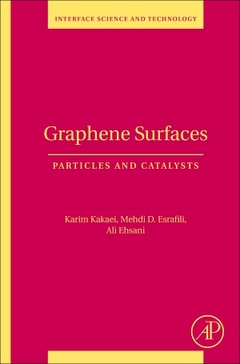Graphene Surfaces Particles and Catalysts Interface Science and Technology Series
Auteurs : Kakaei Karim, Esrafili Mehdi D., Ehsani Ali

Graphene Surfaces: Particles and Catalysts focuses on the surface chemistry and modification of graphene and its derivatives from a theoretical and electrochemical point-of-view. It provides a comprehensive overview of their electronic structure, synthesis, properties and general applications in catalysis science, including their relevance in alcohols and their derivatives oxidation, oxygen reduction, hydrogen evolution, energy storage, corrosion protection and supercapacitors. The book also covers emerging research on graphene chemistry and its impact. Chemical engineers, materials scientists, electrochemists and engineers will find information that will answer their most pressing questions on the surface aspects of graphene and its effect on catalysis.
1. An introduction to catalysis 2. Atomic properties and electronic structure 3. Synthesis and surface modification 4. Characterization 5. Graphene-based metal particles 6. Oxygen reduction reaction 7. Alcohols oxidation and hydrogen evolution 8. Graphene and anticorrosive properties 9. Graphene-based electrochemical supercapacitors 10. Gas convertor and storage
Researchers in industry, scientists in academia, and graduated students in chemical engineering, materials science, electrochemistry, and engineering working on graphene, graphene-doped and other graphene-based materials
Mehdi D. Esrafili received his MS & Ph.D at Tarbiat Modares University. Then, he joined Kyoto University. Dr. Esrafili is currently working as Head of Laboratory and working group on computational chemistry at University of Maragheh, Iran. His research focuses on intermolecular interactions and reaction mechanism using electronic structure methods.
Dr. Ali Ehsani has a multidisciplinary background and a broad research interest in electrochemical systems. He published numerous ISI articles in electrochemical systems such as graphene based materials as a supercapacitors, electrocatalysts and corrosion inhibitors.
- Serves as a time-saving reference for researchers, graduated students and chemical engineers
- Equips the reader with catalysis knowledge for practical applications
- Discusses the physical and electrochemical properties of graphene
- Provides the most important applications of graphene in electrochemical systems
- Highlights both experimental and theoretical aspects of graphene
Date de parution : 10-2018
Ouvrage de 456 p.
15x22.8 cm
Thèmes de Graphene Surfaces :
Mots-clés :
2D materials; Activation energy; Alcohol oxidation; Alkaline and acidic media; Applications; Bonding; Catalysis; Chemical vapor deposition; Coating; Composite; Conductive polymer; Corrosion; Decorated graphene; Decoration; Density functional theory; Detection methods; DFT; Doped graphene; Electrochemical exfoliation; Electrochemical hydrogen evolution reaction; Electronic structure; Energy storage; Experimental analysis; Gas convertor; Graphene bonding; Graphene characteristics; Graphene layer; Graphene observation; Graphene synthesis; Graphene; Graphene-based noble metal; Graphene-based nonnoble metals; Green chemistry; H2 storage; Heteroatom-doped graphene; Heterogeneous catalysis; Hybridization; Impedance; Mechanical exfoliation; Metal oxide; Method; Nanoparticles; Oxygen reduction reaction; Sensor; Single-atom catalysis; Supercapacitor; Surface reactivity; Synthetic development; Techniques


